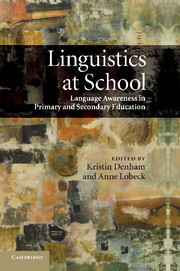Book contents
- Frontmatter
- Contents
- Notes on contributors
- Foreword: The challenge for education
- Introduction
- Part I Linguistics from the top down: encouraging institutional change
- Part II Linguistics from the bottom up: encouraging classroom change
- Introduction to Part II
- 9 From cold shoulder to funded welcome: lessons from the trenches of dialectally diverse classrooms
- 10 Positioning linguists as learners in K-12 schools
- 11 Fostering teacher change: effective professional development for sociolinguistic diversity
- 12 On promoting linguistics literacy: bringing language science to the English classroom
- 13 Linguistics in a primary school
- 14 Educating linguists: how partner teaching enriches linguistics
- 15 The Linguistic Olympiads: academic competitions in linguistics for secondary school students
- Part III Vignettes: voices from the classroom
- References
- Index
15 - The Linguistic Olympiads: academic competitions in linguistics for secondary school students
Published online by Cambridge University Press: 04 August 2010
- Frontmatter
- Contents
- Notes on contributors
- Foreword: The challenge for education
- Introduction
- Part I Linguistics from the top down: encouraging institutional change
- Part II Linguistics from the bottom up: encouraging classroom change
- Introduction to Part II
- 9 From cold shoulder to funded welcome: lessons from the trenches of dialectally diverse classrooms
- 10 Positioning linguists as learners in K-12 schools
- 11 Fostering teacher change: effective professional development for sociolinguistic diversity
- 12 On promoting linguistics literacy: bringing language science to the English classroom
- 13 Linguistics in a primary school
- 14 Educating linguists: how partner teaching enriches linguistics
- 15 The Linguistic Olympiads: academic competitions in linguistics for secondary school students
- Part III Vignettes: voices from the classroom
- References
- Index
Summary
Introduction
Since the mid-1960s, problem-solving competitions in linguistics for secondary school students have been taking place at various locations around the world. In Russia, the Moscow and St. Petersburg Linguistic Olympiads are credited with inspiring hundreds of young talented scholars to choose linguistics as an academic major and profession. Presently (2009) there are national contests in Bulgaria, the Netherlands and several other European countries, and the US. There is also an International Linguistic Olympiad in which students from many countries compete, as well as dozens of local competitions held in individual towns and schools across Europe and the US.
In this chapter we will describe the basic Linguistic Olympiad (LO) concept, and will argue for its significance for linguistics and related fields on a number of levels. Following this, we will provide specific descriptions of how the LO concept has been implemented in Russia, Bulgaria, the US and internationally.
The genius of LO
At the heart of the LO concept is the self-sufficient linguistics problem, a unique genre of composition that presents linguistic facts and phenomena in enigmatic form. A steady supply of original, thoughtfully created and intriguing problems is absolutely necessary for the success of any ongoing LO program. In a typical “live” competition, students are given several hours to solve a set of problems, many of which involve data from languages the students have never heard of, while others may highlight little-known features of commonly known languages or formal representations of natural languages.
- Type
- Chapter
- Information
- Linguistics at SchoolLanguage Awareness in Primary and Secondary Education, pp. 213 - 226Publisher: Cambridge University PressPrint publication year: 2010
- 6
- Cited by

